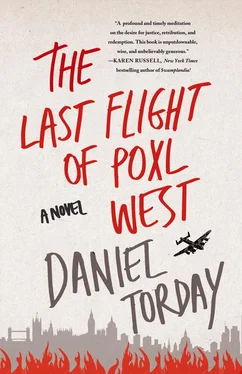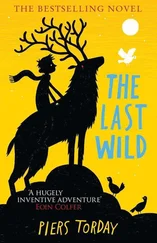We were sitting now, me in the chair in front of Rabbi Ben’s cluttered desk, him behind it. I was ready to hear what he had to say. Receptive.
“So I finally had a chance to read Skylock, dude,” Rabbi Ben said. This was unexpected. It threw me for a moment, made me more comfortable than I could have anticipated. Here I was, ready to ask him about the Zohar, all that he’d wanted to talk about for months, and instead he was bringing up Poxl West’s memoir.
“And?” I said.
“And!” Rabbi Ben said. “Your uncle’s a majorly good writer, and mein Gott the experiences he’s had. I can totally see why you’ve been so into that book. And him.”
“Well, he is my uncle,” I said. Talking to Rabbi Ben, in that moment, all my regret and sense of absence was gone. It was almost as if Poxl were back with us. “I did kind of play a part in helping him get his manuscript together.”
“It occurs to me that some of what goes on in there isn’t so different from what draws me to the Zohar. I mean, when he describes flying in his plane, he describes looking into the face of the whirlwind. That’s what Job did, right? Look right into the face of the Behemoth. For me that’s why I care about thinking about God. Not just to say, ‘What stories do we read in the Torah?’ ‘But to say, ‘What would it look like to meet face-to-face with the deity?’”
When Rabbi Ben had brought this up in class, we were too uncomfortable to discuss it. But sitting in his office, I remember I gave it real thought. What had Poxl West seen up in those skies? And more important: What occurred in my daily life that could bring me face-to-face with Ein Sof? Rabbi Ben gave me a handful of books to take home. I stuffed them into my book bag and thanked him.
I wish I could say now that I’d read them.
But once they sat down on the shelf next to Skylock, their gray cloth covers just seemed so gray. There was a book full of stories of heroism and emotional drama; here was some unintelligible drawing of Hebrew letters adding up to a rudimentary picture of a body that might be our Lord. And there I was, a teenager, confused. I wanted to think about mysticism, but it grew ever more intangible the more I thought about how tangible Poxl West’s story was. That it had come almost to replace the human himself for me. I liked Rabbi Ben and I liked Gershom Scholem, but for me, then, with Poxl gone and only his book to consult, it was still Skylock to which I’d be turning in my moments of confusion.
Finally in May, I turned in a final report in history class on Uncle Poxl’s memoir, which by then I’d read five times. Each time I reread I watched as Poxl again left his mother in Leitmeritz, again left Françoise, again left Glynnis for training. As much as it hurt, as much as it tore the scab off my not having spent time with him, what I fell back on was his heroism, and what came after. I cited more than a dozen sources on the Royal Air Force in the report, sources on military actions in Britain during the war. I quoted from two other memoirs, and I even learned to make the citations properly.
Interspersed within those quotations and summaries, I wrote florid reminiscences of my trips into Boston with Poxl, memories that made it feel almost as if he were back again, taking me to see Shakespeare, to eat sundaes. Almost. As I wrote, I overplayed my role in giving him someone to talk to while he was drafting the book. I won’t lie: No matter what ended up in it, I still feel some pride now thinking of how hard I worked on that report. No matter what was to come, no matter what lay beneath any of my motivations during that period, Poxl West had brought to life in me a curiosity I wouldn’t otherwise have had. One I retain to this day.
When I got the report back a week later, my teacher had written on the last page, “Impressive research, impressive topic, impressive writing, impressive, impressive, impressive. And above all, impressive company you’ve been keeping. Meticulous work: A−. Keep up the good work.”
1.
My first few weeks after enlisting in the RAF were taken up with logistics. I was given an examination in math, which I passed with ease. I was issued a respirator and identity disks, eating utensils, and a whole new set of vaccinations should I be shot down over North Africa. An officer in his RAF blues gave me and three other recruits a lecture about how short we should keep our hair, how it was imperative that a pilot shower after each run, and bathe himself every other day on any account.
“If you meet some young thing in the NAAFI, you’re to use protection,” this officer said. The idea of meeting any “young thing” was far from my mind at that moment. This officer was tall, and broader across the chest than the Elbe near Brüder Weisberg, and of a British type who, frankly, scared me. “We don’t need any more of our crew walking around with balls swollen with disease, if you see what I’m bloody saying.”
We saw.
The walls grew brighter and my palms began to sweat, thinking what diseases I myself might have acquired, having spent more than a year sleeping with Françoise and now Glynnis. It was as if the world before me was succumbing to splashes of color, and a kind of spasm shook my eyeballs so that I could not focus. I could think now of what diseases I might have, but had I thought before of what the experience was to them? I didn’t even know what Françoise’s fate was, let alone what she might be thinking now.
In a room with dun-colored floors, which smelled antiseptic and vaguely of man sweat, an officer shouted that I was to take off my clothing. Soon he hit me with a painful spray from a hose to assure I was rid of any bugs. From there I was whisked off to a Nissen hut where I was to spend the night, before moving along to begin my training.
Next day I rode by train down to the southern coast, where I was plied further with a trainee’s gear at the Initial Training Wing to which I was assigned. It was the same train Glynnis and I had ridden to visit Mrs. Goldring not three months earlier. Water still lay in the fields, and now the fields, which only rarely had been scarred by bombs, were torn up, as if plagued by some infernal vermin. I pulled down my rucksack to inventory my new possessions. Everything seemed to come in threes: three navy blue sweaters, and three pairs of heavy socks (“You’ll need those up there, it’s cold as hell at thirty thousand feet”), three service collars, and three service shirts, stiff and itchy on those first days I donned them. I’d received fork and knife, and today a heavy navy blue wool sweater with a cable-knit collar, which I would later learn was named after the British isle of Guernsey. Again hygiene was a major concern, and while I found the treatment of the RAF officer rather lax compared to those conventional views one is given of the rigor of military life, I received bristled items of all varieties — one for my clothing, one for my boots, even one to keep the buttons of my uniform clean.
After that train ride east — after our path departed from those tracks Glynnis and I had once traveled on and dipped farther south — my memory consists only of the chaos of orientation and more lectures on basic personal comportment before I was soon on a train headed north, this time to RAF Cranwell. There I was stationed in yet another Nissen hut. During the days I rose at seven and was in the classroom in yet another Nissen hut where starting at eight every morning I was plied with a deluge of English words— nacelles, ailerons, throttles, glycol; cumulus, stratus, cirrus —and where I earned mediocre scores at gunnery (I never got comfortable with the Browning automatic) and in my use of the Morse buzzer, which in the end was of far greater use to the navigator than it was to me.
Читать дальше












